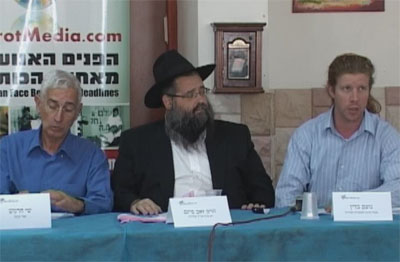A day before the Hamas-Israel ceasefire officially ended, Sderot Media Center facilitated a press conference with a panel of Sderot officials who provided brief updates of the security situation and the impact of the ceasefire on the area residents to Israeli and international press.
Member of Knesset and Kadima party member, Shai Chermesh, who is a resident of Kfar Aza, a western Negev community under daily mortar shelling, participated in the panel. He stated that the ceasefire had yielded no positive results for Israel. “Gilad Schalit is still in Gaza and Sderot and western Negev residents are still under rocket fire. This is a reality that our government must deal with and as of now, the government of Israel has shown that it has little authority over what is happening to Sderot and the western Negev,” MK Chermesh concluded.
“Hamas is the occupying power of Gaza and has treated its constituents terribly,” he added. “Hamas must stop using their own Palestinian civilians as sacrificial offerings by employing rocket terror tactics against innocent Israelis.”
Chermesh stated that he believed that disengaging from Gaza in 2005 was a positive move. “It was important that we left and it was too bad that we didn’t leave earlier,” he stated. “If the IDF re-enters Gaza, the attack must be planned carefully. The people of Gaza should not go hungry and we must limit civilian causalities as much as possible.”
Batya Katar, representing the Parents Association for the security of Sderot, stated that Sderot residents feel that Sderot is a separate entity. “We don’t have the right leaders to deal with the reality of the region,” she said. “If this was happening in Tel Aviv, there would be a completely different reaction from the government.”
“Only yesterday evening, a Palestinian rocket landed right outside a busy supermarket. People outside at the time barely escaped the rocket explosion,” Katar added. “Thanks to the Tzeva Adom, they were able to make it inside, but the attack could have been deadly. How many more rocket attacks must Sderot experience, how many near-death experiences must Sderot residents endure–before the government of Israel acts?”
The president of Sderot’s Small Businesses Association, Danny Dahan told the press that the rocket fire was economically crippling the region. Dahan, who owns Dahan’s supermarket in Sderot, explained that the changed shopping patterns of his customers–“they rush in and rush out” has contributed to the decrease in sales. “People no longer linger around, taking their time to buy food. Everyone wants to go home as quickly as possible.” Dahan also stated that due to the rocket fire, there were problems with shipments of goods coming into Sderot. “Some of our suppliers refuse to enter Sderot because of the rocket fire. Many times, I end up going to the junction in Ashkelon to pick up the goods for my supermarket.”
Noam Bedein, Sderot Media Center director, highlighted that the over 2,500 Palestinian rockets fired at Sderot and the western Negev have caused a marked increase in psychological trauma among Sderot children. “Between 70-94% of Sderot children are suffering from signs of PTSD, according to a recent NATAL survey” Bedein stated.
Bedein also related that between 300-400 Palestinian rockets have been fired at Israel since the ceasefire began in June. Yehuda Ben Maman, the Sderot security officer, added that although many bomb shelters have emerged throughout Sderot in the recent year, most of the structures provide protection from rocket shrapnel only and not from direct Qassam rocket hits.











